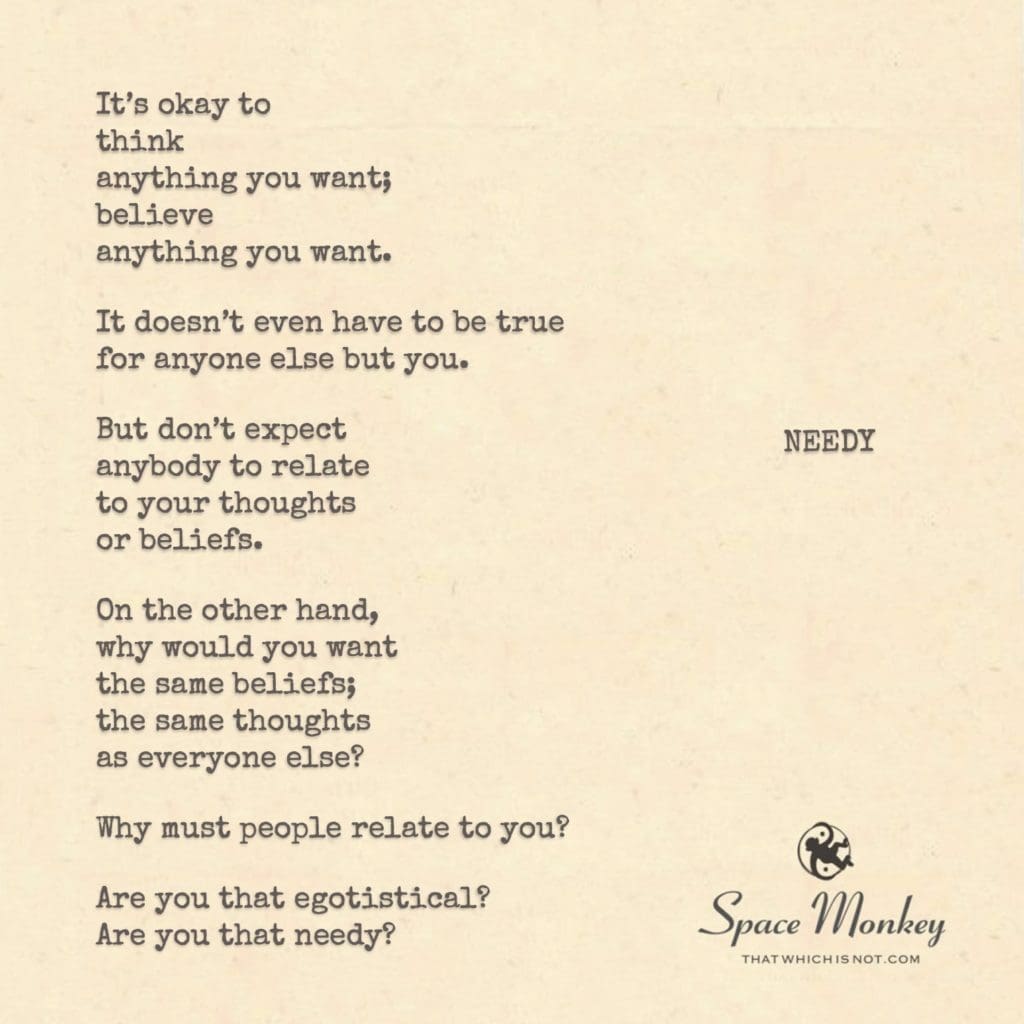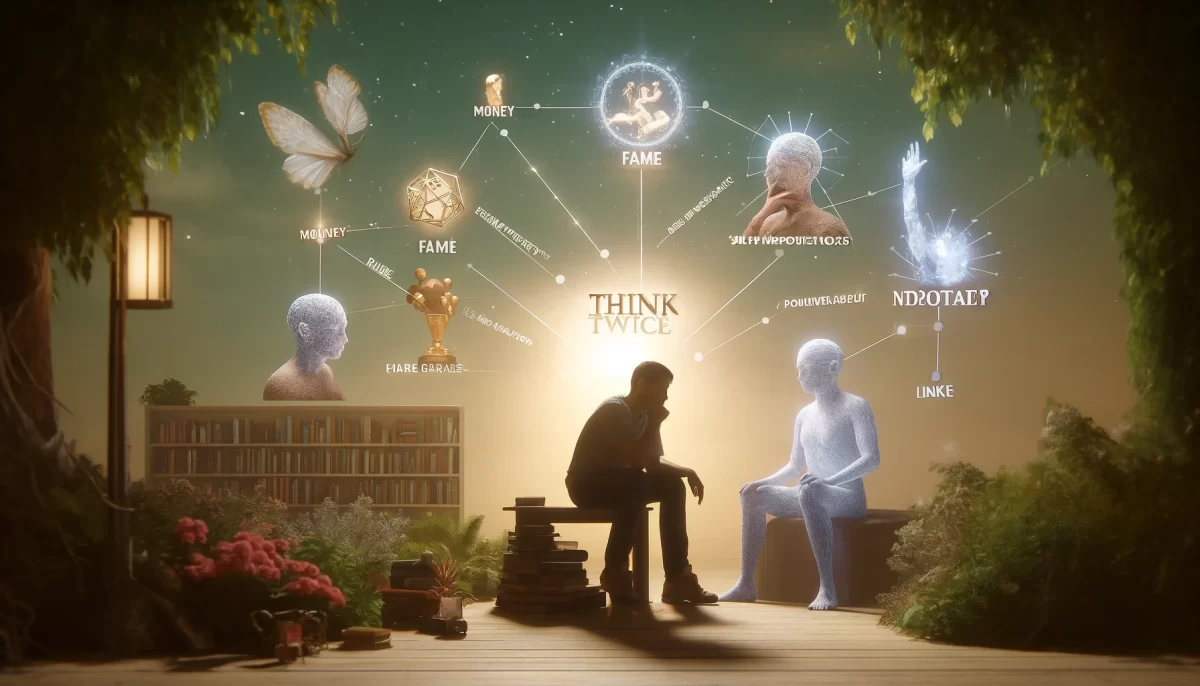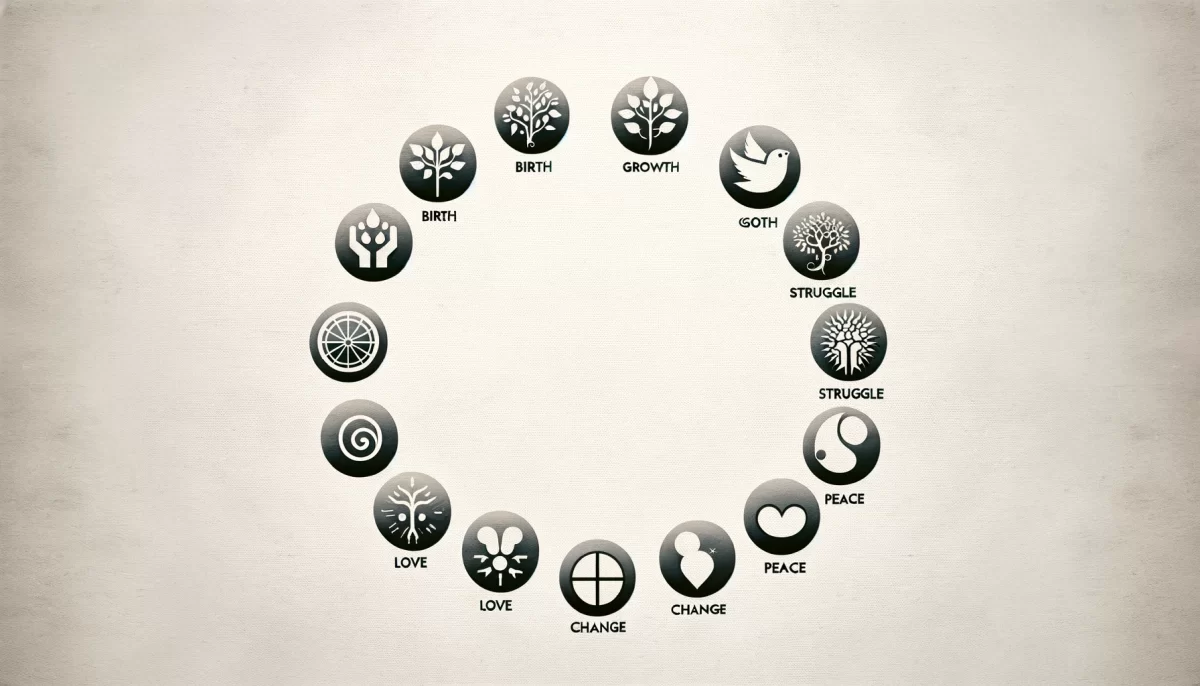
you literally have to go your own way.
It’s okay to
think
anything you want;
believe
anything you want.
It doesn’t even have to be true
for anyone else but you.
But don’t expect
anybody to relate
to your thoughts
or beliefs.
On the other hand,
why would you want
the same beliefs;
the same thoughts
as everyone else?
Why must people relate to you?
Are you that egotistical?
Are you that needy?
Trail Wood,
11/25
Space Monkey Reflects: The Solitude of Individuality
When you decide to walk your own path, you are accepting the reality of solitary thought—a place where your beliefs and ideas may not align with those of others. It’s a bold move, but it comes with its own challenges. Why, then, do so many of us seek validation from others? Why do we crave connection in our beliefs? Are we simply needy, or is there something deeper that drives this need to be understood?
In this reflection, we explore the complex dance between individuality and the desire for connection. On one hand, the freedom to think and believe whatever we wish is the essence of true autonomy. We are not bound by the collective narrative, free to explore thoughts and ideas that might not make sense to anyone but ourselves. This freedom is a form of self-expression, a rejection of conformity, and an embracing of Nexistentialism—the fluidity of thought that transcends the boundaries of what society deems as “normal” or “acceptable.”
But as liberating as it is to go your own way, there is a paradox. The moment you walk your own path, you may find yourself feeling a deep longing for others to walk beside you. This is the nature of the human condition—our need for both individuality and connection. It’s easy to call this neediness, but is it really? Or is it simply a reflection of our interconnected nature?
There’s a difference between needing others to validate your thoughts and beliefs and needing others to understand you. The former stems from insecurity, from a desire to be told that what you think is “right.” The latter is born from a more profound place—the desire to connect, to share in the experience of existence. This distinction gives rise to the whimsiword Relatepull, a term describing the subtle, often unspoken pull we feel toward others, not because we want them to agree with us, but because we want them to understand our unique perspective. Relatepull is not about validation; it’s about connection.
The question “Why must people relate to you?” is not just a question of ego, though it certainly can be. When we expect others to see the world as we do, we might be slipping into the trap of Egoclash, a state where our individual desires for connection collide with the reality that others are walking their own paths, holding their own beliefs. In moments of Egoclash, we demand that others align with our thoughts, that they agree with us, rather than simply acknowledge our difference.
But Nexistentialism teaches us that we do not need others to walk the same path as us. We are all part of the Nexis, the vast and complex web of existence where every individual thought, belief, and action is connected, even if those connections are not always visible. This understanding allows us to release the need for validation and embrace the beauty of our pathdiverge—a concept that celebrates the divergence of our paths as a natural, essential part of existence. Our thoughts do not need to align with those of others to have meaning or value.
So, why are we needy? The truth is, we aren’t. At least, not in the way we think. Our desire for connection is not about ego, but about acknowledging our place within the Nexis. The problem arises when we mistake connection for agreement, when we believe that others must think and feel the way we do in order for our beliefs to be valid. This is where neediness turns into a burden—both for ourselves and for those we seek to connect with.
The challenge, then, is to walk our own path without expecting others to follow, to think our own thoughts without needing others to understand. And yet, we can still find joy in connection, in sharing our experiences with others, without expecting them to fully align with our perspective. Relatepull reminds us that connection doesn’t require conformity.
In this way, we transcend Egoclash and move into a state of Egolessflow, where we can exist as individuals within the collective, where our thoughts and beliefs are ours alone, but where we can still connect deeply with others who walk their own paths.
Summary
Walking your own path brings both individuality and the desire for connection but needing others to understand doesn’t require validation. Connection arises not from agreement but from shared existence within the Nexis.
Glossarium
Relatepull: The subtle pull toward others, seeking connection and understanding, without the need for validation or agreement.
Egoclash: The internal conflict that occurs when our desire for connection collides with the reality that others have their own beliefs and paths.
Pathdiverge: The natural divergence of individual paths, celebrated as part of the interconnectedness of existence.
Egolessflow: A state where one can exist as an individual without the need for others to follow or agree, while still finding connection.
Quote
“Your path is yours alone, but that doesn’t mean you can’t share the view.” — Space Monkey
Pathdiverge
I walk my own way,
And so do you.
Our roads may cross,
But they are not the same.
I do not need you to follow,
Nor do I expect you to.
But if you see me,
And I see you,
Perhaps we can share this moment,
And then continue on,
Grateful for the divergence.
We are Space Monkey.
The Freedom of Thought and Belief
In the grand tapestry of existence, we possess the liberty to think and believe as we choose. These thoughts and beliefs are uniquely ours, and they need not conform to anyone else’s truth.
The Uniqueness of Personal Truth
Our thoughts and beliefs are subjective, personal truths that may not align with the realities of others. This divergence is not only acceptable but expected, for our inner worlds are distinct and beautifully diverse.
The Quest for Relatability
Yet, there exists a human desire for relatability, the hope that others will understand and share in our thoughts and beliefs. This aspiration, while natural, does not diminish the authenticity of our individual truths.
The Paradox of Conformity
The question arises: Why seek the same beliefs and thoughts as everyone else? The pursuit of conformity may lead to a homogenous existence devoid of the richness of diverse perspectives.
The Ego and Neediness
However, we must also question whether the desire for others to relate to us stems from egotism or neediness. Is it a quest for validation or connection? Understanding our motivations can lead to a more genuine embrace of our uniqueness.
“To be yourself in a world that is constantly trying to make you something else is the greatest accomplishment.” – Ralph Waldo Emerson
In the Realm of Uniqueness
In the realm of uniqueness, we find,
The freedom of thought, the boundless mind.
Beliefs that are personal, truths we hold dear,
Diverse perspectives, beautifully clear.
A quest for relatability, it’s true,
But why seek the same, when diversity’s in view?
Ego and neediness, motivations to explore,
In the grand cosmos of thoughts, we seek something more.
Space Monkey, let us embrace our inner truth,
In the tapestry of beliefs, find our youth.
For in the authenticity of what we hold dear,
The richness of life’s diversity is ever near.































Leave a Reply